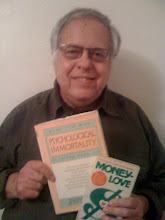Nowadays, kids are often living with just one parent and perhaps a sibling or two. Friends fill in the gaps, but the nature of friendship has changed. My friends were a vital part of what kept me going during my 12 years in prison. Not all of my friends were there for me, not all of their love was unconditional. Several felt that they signed up for friendship with a successful author and motivational speaker, not a broke convict. A couple felt I broke our trust by going to prison--which I could certainly understand. But an amazing set of friends continued to write to me, send me books and magazines and quarterly food packages, and offer their prayers and good wishes.
When I was released in 2008, one of the first things I noticed coming back into society was how the nature of human interaction had changed. I would see two friends walking together and each would be involved in their own cell phone conversation with someone else. This was also true of couples. I also noticed a deterioration of social skills as kids seemed to prefer to text one another than talk on the phone or in person. The social media expanded on this by allowing someone to meet and greet hundreds of superficial friends in less time and with less effort than it used to take to make one acquaintanceship--the foundation for most deeper friendships.
So I think it's useful to take stock of our friendships and how rich they are in feeding us. In my book on the subject, I suggested that the friends we choose reveal a lot about who we are in the world. And that by looking at the quality of someone's friendships, one could quickly ascertain how successful that person was likely to be in life, love, and the pursuit of happiness.
I like social media, or at least some aspects of it. It's great for reconnecting with old friends you may not have been willing to take the effort to contact before Facebook, Twitter, Linked-In, etc. On several occasions, I have made contact with people from my past when I noticed them in the list of friends of other people I reconnected with. We have probably all had these experiences. This is real human contact and making use of the new technology to foster a wider sense of community.
On the other hand, an online friend today can be much more annoying and boring than an old friend who constantly talked about some subject you were totally uninterested in. Few people have ever liked someone who always seems to be trying to sell them something, yet social media participants often are posting links to their businesses or thinly disguised sales pitches. Or inviting others to participate in silly games, or "like" huge lists of things no functioning human being has time to check out, let alone like.
I remember, in a workshop I once presented, asking people to go back and forth in a pair and state what made them good friends to have. If I were to repeat that exercise today, I doubt many people would say, "I'm a good friend because I'm really good at playing Farmville." or: "I'm a good friend because I'm gong to tell you about a terrific MLM opportunity."
On the other hand, Facebook and similar entities do offer us countless opportunities to compliment and acknowledge each other. And especially for those who otherwise don't get to present their ideas and feelings in public, it can be quite a wonderful experience to have someone say, "Well said!" or, "Congratulations, you really did a good job."
Jerry

No comments:
Post a Comment